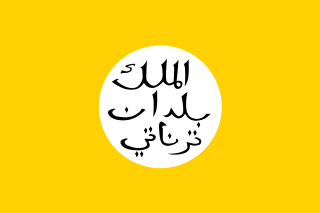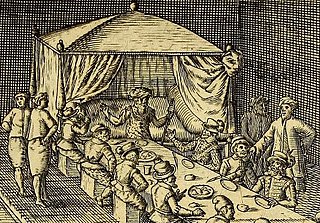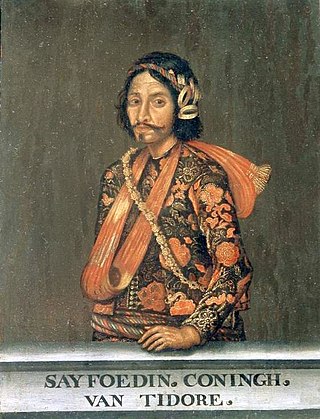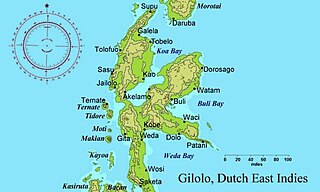
North Maluku is a province of Indonesia. It covers the northern part of the Maluku Islands, bordering the Pacific Ocean to the north, the Halmahera Sea to the east, the Molucca Sea to the west, and the Seram Sea to the south. It shares maritime borders with North Sulawesi, Southeast Sulawesi and Central Sulawesi to the west, Maluku to the south, Southwest Papua to the west, and Palau and the Philippines to the north. The provincial capital is Sofifi on the largest island of Halmahera, while the largest city is the island city of Ternate. The population of North Maluku was 1,038,087 in the 2010 census, making it one of the least-populous provinces in Indonesia, but by the 2020 Census the population had risen to 1,282,937, and the official estimate as at mid 2023 was 1,328,594.

The Sultanate of Ternate, previously also known as the Kingdom of Gapi is one of the oldest Muslim kingdoms in Indonesia besides the sultanates of Tidore, Jailolo, and Bacan.

The Sultanate of Tidore was a sultanate in Southeast Asia, centered on Tidore in the Maluku Islands. It was also known as Duko, its ruler carrying the title Kië ma-kolano. Tidore was a rival of the Sultanate of Ternate for control of the spice trade and had an important historical role as binding the archipelagic civilizations of Indonesia to the Papuan world. According to extant historical records, in particular the genealogies of the kings of Ternate and Tidore, the inaugural Tidorese king was Sahjati or Muhammad Naqil whose enthronement is dated 1081 in local tradition. However, the accuracy of the tradition that Tidore emerged as a polity as early as the 11th century is considered debatable. Islam was only made the official state religion in the late 15th century through the ninth King of Tidore, Sultan Jamaluddin. He was influenced by the preachings of Syekh Mansur, originally from Arabia. In the 16th and 17th centuries, the Sultans tended to ally with either Spain or Portugal to maintain their political role but were finally drawn into the Dutch sphere of power in 1663. Despite a period of anti-colonial rebellion in 1780–1810, the Dutch grip on the sultanate increased until decolonization in the 1940s. Meanwhile, Tidore's suzerainty over Raja Ampat and western Papua was acknowledged by the colonial state. In modern times, the sultanate has been revived as a cultural institution.

The Sultanate of Bacan was a state in Maluku Islands, present-day Indonesia that arose with the expansion of the spice trade in late medieval times. It mainly consisted of the Bacan Islands but had periodical influence in Ceram and the Papuan Islands. It fell under the colonial influence of Portugal in the 16th century and the Dutch East India Company (VOC) after 1609. Bacan was one of the four kingdoms of Maluku together with Ternate, Tidore and Jailolo, but tended to be overshadowed by Ternate. After the independence of Indonesia in 1949, the governing functions of the sultan were gradually replaced by a modern administrative structure. However, the sultanate has been revived as a cultural entity in present times.

Sultan Babullah, also known as Sultan Baabullah was the 7th Sultan and 24th ruler of the Sultanate of Ternate in Maluku who ruled between 1570 and 1583. He is known as the greatest Sultan in Ternatan and Moluccan history, who defeated the Portuguese occupants in Ternate and led the Sultanate to a golden peak at the end of the 16th century. Sultan Babullah was commonly known as the Ruler of 72 (Inhabited) Islands in eastern Indonesia, including most of the Maluku Islands, Sangihe and parts of Sulawesi, with influences as far as Solor, East Sumbawa, Mindanao, and the Papuan Islands. His reign inaugurated a period of free trade in the spices and forest products that gave Maluku a significant role in Asian commerce.
Sultan Hairun Jamilu was the 6th Muslim ruler of Ternate in Maluku, reigning from 1535 to 1570. During his long reign, he had a shifting relation to the Portuguese who had a stronghold in Ternate and tried to dominate the spice trade in the region. This ended with his assassination at the hands of a Portuguese soldier in 1570.
Dayal also known as Hidayatullah was the fourth Sultan of Ternate in Maluku. He had a short and largely nominal reign between 1529 and 1533 before fleeing Ternate due to Portuguese pressure. He later tried to create an anti-Portuguese alliance among the kings in North Maluku, but was mortally wounded in battle against the Europeans.

Sultan Saidi Berkat was the eighth Sultan of Ternate in the Maluku Islands. His capital and seat of power was in the city of Ternate. He succeeded to the extensive east Indonesian realm built up by his father Sultan Babullah, reigning from 1583 to 1606. The Spanish, who colonized the Philippines and had interests in Maluku, repeatedly tried to subdue Ternate, but were unsuccessful in their early attempts. Saidi's reign coincides with the arrival of the Dutch in Maluku, which indirectly caused his deposal and exile through a Spanish invasion.
Sultan Hamza was the tenth Sultan of Ternate in the Maluku Islands. He ruled from 1627 to 1648, during a time when the Dutch East India Company (VOC) increasingly dominated this part of maritime Southeast Asia, and the increasing power of the Makassar kingdom threatened the Ternatan possessions.
Sultan Mandar Syah was the 11th Sultan of Ternate who reigned from 1648 to 1675. Like his predecessors he was heavily dependent on the Dutch East India Company (VOC), and was forced to comply to Dutch demands to extirpate spice trees in his domains, ensuring Dutch monopoly of the profitable spice trade. During the Great Ambon War in the 1650s, Mandar Syah sided with the VOC but was nevertheless pushed to cede control over areas in Central Maluku. On the other hand, the Ternate-VOC alliance led to a large increase of Ternatan territory in the war with Makassar in 1667.
Sultan Sibori Amsterdam was the twelfth Sultan of Ternate in the Maluku Islands who reigned from 1675 to 1690. He participated in the last outburst of armed resistance against the Dutch East India Company (VOC) in 1679–1681, but was eventually forced to sign a new treaty that reduced Ternate to a mere vassal of the Company. In that way he was the last formally independent Sultan before the onset of early-modern Dutch colonialism.
Sultan Al-Mansur was the second Sultan of Tidore in Maluku islands, who reigned from at least 1512 until 1526. Certain legends associate him with the beginnings of Tidore's rule over the Papuan Islands and western New Guinea. During his reign the first visits by Portuguese and Spanish seafarers took place, which led to grave political and economic consequences for the societies of eastern Indonesia. Trying to preserve his realm in the face of Western encroachment, he finally fell victim to Portuguese enmity.
Mole Majimun was the seventh Sultan of Tidore in Maluku Islands, who reigned from 1599 to 1627. He was also known as Sultan Jumaldin or Kaicili Mole. In his time the transition to the hegemony of the Dutch East India Company (VOC) began in eastern Indonesia, though Tidore held on to its traditional alliance with the Spanish Empire.
Sultan Ngarolamo was the eighth Sultan of Tidore in Maluku Islands. He was also known as Sultan Alauddin, or Kaicili Ngaro, ruling from 1627 to 1634. Due to a combination of factors he was deposed after a short reign and was eventually killed at the instigation of the Sultan of Ternate.
Sultan Gorontalo was the ninth Sultan of Tidore in Maluku Islands, ruling from 1634 to 1639. His brief reign was caught up in the tension between the Spanish Empire and the Dutch East India Company, leading to his violent death in 1639.
Sultan Saidi was the tenth Sultan of Tidore in Maluku islands. He was also known as Magiau, and ruled from 1640 to 1657. His reign saw intermittent hostilities with Tidore's traditional rival, the Sultanate of Ternate, which included interference in an anti-Dutch rebellion in Ternate and Ambon and attempts to increase Tidorese territory in Maluku. By the time of Saidi's reign Tidore had gained a political position in parts of the Papuan territories.

Sultan Saifuddin, also known as Golofino was the eleventh Sultan of Tidore in Maluku islands. Reigning from 1657 to 1687, he left Tidore's old alliance with the Spanish Empire and made treaties with the Dutch East India Company (VOC), which now became hegemonic in Maluku for the next century. Tidore was forced to extirpate the clove trees in its territory and thus ceased to be a spice Sultanate. In spite of this, Saifuddin and his successors were able to preserve a degree of independence due to the trade in products from the Papuan Islands and New Guinea.

Nuku was the nineteenth Sultan of Tidore in Maluku Islands, reigning from 1797 to 1805. He is also known under the names Sultan Muhammad al-Mabus Amiruddin Syah, Saifuddin, Jou Barakati, and Kaicili Paparangan. He led a resistance against Dutch colonialism in Maluku and Papua from 1780 which was eventually successful. Being a leader with great charisma, he gathered discontents from several ethnic groups and strove to restore Maluku to its pre-colonial division into four autonomous kingdoms. Nuku used global political conflict lines by allying with the British against the French-affiliated Dutch and helped them conquer the Dutch stronghold in Ternate in 1801. In modern Indonesia he is commemorated as a pahlawan nasional.

The Sultanate of Jailolo was a premodern state in Maluku, modern Indonesia that emerged with the increasing trade in cloves in the Middle Ages. Also spelt Gilolo, it was one of the four kingdoms of Maluku together with Ternate, Tidore, and Bacan, having its center at a bay on the west side of Halmahera. Jailolo existed as an independent kingdom until 1551 and had separate rulers for periods after that date. A revivalist Raja Jailolo movement made for much social and political unrest in Maluku in the 19th century. In modern times the sultanate has been revived as a symbolic entity.










